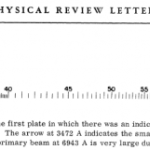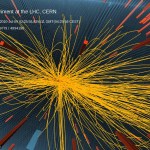Physical Sciences
What is it with these loons? They've got nothing, but they're continually telling us what they could accomplish, if only they…what? I don't know.
The latest trend in kook blogs is to tell us all the things that would happen if we only accepted their weird premises. Here, for example, is Terry Hurlbut, explaining what America would be like if creationists controlled science.
This hypothetical creation-oriented society would take scientific education, research, and investigation in a new direction. Astronomers would stop looking for "dark matter" and "dark energy," and instead develop a uniform…
Most of what would ordinarily be blogging time this morning got used up writing a response to a question at the
Physics Stack Exchange. But having put all that effort in over there, I might as well put it to use here, too...
The question comes from a person who did a poster on terminology at the recently concluded American Geophysical Union meeting, offering the following definition of "data":
Values collected as part of a scientific investigation; may be qualified as 'science data'. This includes uncalibrated values (raw data), derived values (calibrated data), and other transformations of…
After you've been blogging as long as I have, you inevitably wind up on a lot of mailing lists. Publicity companies, for instance, long ago discovered that getting a buzz going in the blogosphere is every bit as important as trying to get coverage from the "traditional" media. If you're as fortunate as I've been and your blog achieves a modest degree of fame or notoriety, you can expect to find yourself on a fair number of such mailing lists. At first, I used to read every press release, but now there are just too many. I skim the subject headers, and, if they don't catch my interest…
NOTE: Orac was actually out rather late last night. It turns out that the more administrative responsibility he somehow seems to find the more he has to go out to dinner as a part of various cancer center-related functions. As a result, he is recycling a bit of recent material from elsewhere that he in his extreme arrogance considers just too good not to post up on this blog too. In any case, it's always interesting to see how a different audience reacts to his stuff, and he did make some alterations to this post.
'Tis the season, it would seem, for questioning science. Not that there's…
I can't think of a better way to start year seven on the ol' blog.
Remember how I speculated that perhaps Age of Autism or NaturalNews.com would provide me with the first topic of my next year of blogging? It turns out that I was wrong. It didn't come from either of those sources, although I will reassure the antivaccine loons at AoA and Mike Adams at NaturalNews.com not to fear. I'll get to them soon enough. The Huffington Post, too, given that apparently Mark Hyman's back with his woo. In any case, AoA and Mike Adams may at times be utterly hilarious, but they can't compare to what readers…
Homeopathy is among the most ridiculous of so-called "complementary and alternative medicine therapies." I realize that I've made this point over and over and over again, but it bears repeating because, no matter how often homeopathy is shown to be utter and complete woo, homeopaths always seem to bounce right back, Gish galloping between the bullets of science in order to repeat the same unsupportable claims, nonsense about the "memory of water," and comparisons of homepathy to vaccines. Another reason that homeopathy is an excellent example to discuss is because--well, let's face it--it's…
Gender gap in physics exams reduced by simple writing exercises, says CU-Boulder study
"Women are underrepresented and on average perform more poorly than men in introductory physics. But a recent study finds that this gap arises predominantly from differential preparation prior to college and psychological factors, rather than differences in ability.
And the effects of these psychological factors can be largely overcome with a brief writing exercise focusing on important values, such as friends and family, learning or even music. This simple "values affirmation" writing exercise generally…
Homeopathy remains the perfect quackery because it is nothing but water. Even homeopaths seem to recognize this implicitly. If they did not, then there would be no need for all the mental mastubation they engage in to imbue their magic water with "memory," such that, as Tim Minchin so famously put it, it "remembers" all the good stuff it's been in contact with but forgets all the poo that's been in it. Truly, it is magic. Alternatively, homepaths will try to claim that the process of dilution and vigorous shaking between each serial dilution (or, as homepaths refer to it, succussion) somehow…
An Open Letter to MFA Writing Programs (and Their Students) « Whatever
"So, MFA writing programs, allow me to make a suggestion. Sometime before you hand over that sheepskin with the words "Master of Fine Arts" on it, for which your students may have just paid tens of thousands of dollars (or more), offer them a class on the business of the publishing industry, including an intensive look at contracts. Why? Because, Holy God, they will need it."
(tags: writing publishing business ethics law whatever books academia education)
For Frequent Fliers, a Radiation Risk in the Skies - NYTimes.…
This will be a quiet week - I've got my Dad making his annual visit, a talk, a short trip, and then a slew of guests arriving for the weekend for Simon's 9th birthday party and Simon's first Torah reading (he's too young to read in the main synagogue, but he'll be the youngest kid ever to chant Torah at our shul in Junior Congregation), and there's a lot of cooking, plus the getting-ready-for-winter stuff is in high gear. So don't expect too much of me ;-).
The single FAQ about me is "how do you do it all?" The standard answer I have given since the question started to occur is still true…
Shortly after the invention of the laser, a torrent of discoveries began pouring in thanks to the previously unreachable intensities that became available. Many of these discoveries fall under the general category of "nonlinear optics", which you could more or less say is the study of the behavior of light in a medium whose optical properties are themselves a function of the light intensity. Pretty much all material exhibit nonlinear optical effects if the light is intense enough, but "intense enough" is frequently in the neighborhood of 10^20 watts per square meter.
Once lasers were invented…
Moving Toward Quantum Computing - Science in 2011 - NYTimes.com
"In 1981 the physicist Richard Feynman speculated about the possibility of "tiny computers obeying quantum mechanical laws." He suggested that such a quantum computer might be the best way to simulate real-world quantum systems, a challenge that today is largely beyond the calculating power of even the fastest supercomputers.
Since then there has been sporadic progress in building this kind of computer. The experiments to date, however, have largely yielded only systems that seek to demonstrate that the principle is sound. They…
Hi ScienceBlogs... it is GREAT to be here!
I just spent the weekend with many of the scientists whose research has comprised the bulk of my reading material (ie brain-biggering) over the last 1.5 years... yikes! I also got to meet many other young scientists hoping to make a career out of this crazy science game. It was totally awesome, and quite a whirlwind.
I was at the 2010 Ridge2000 community meeting in Portland, OR. It was a meeting of about 140 people united by their shared interested in better understanding what goes on at mid-ocean ridges. We represented disciplines ranging from…
"People fear death even more than pain. It's strange that they fear death. Life hurts a lot more than death. At the point of death, the pain is over. Yeah, I guess it is a friend." -Jim Morrison
Yes, Jim Morrison, some people are quite strange, too.
People Are StrangeBut that's not what I'm talking about. You see, one of the "doomsday" scenarios people are talking about over at the Large Hadron Collider (LHC) -- in addition to black holes -- are out-of-control strangelets.
Let's talk about what these things are, what people are afraid of, and whether there really is anything worth fearing.…
View image
The gullies on a Martian sand dune in this trio of images from NASA's Mars Reconnaissance Orbiter deceptively resemble features on Earth that are carved by streams of water. However, these gullies likely owe their existence to entirely different geological processes apparently related to the winter buildup of carbon-dioxide frost.
Scientists at the University of Arizona, Tucson, and at Johns Hopkins University Applied Physics Laboratory, Laurel, Md., compared pairs of images from before and after changes in such dune gullies. They determined that the changes occur in Martian…
Polson High School students use primitive bows to study physics
"It's one thing to put Montana's Indian Education for All Act to work in a social studies classroom.
Physics? That would seem to be a whole 'nother matter.
And it is. But certainly not, as Polson High School teacher Jon Petersen is proving, impossible.
Petersen's physics students spent their class time Tuesday measuring elastic potential energy.
But they did so using two primitive bows, one made of hickory and the other of vine maple, built by Confederated Salish and Kootenai Tribal member Francis Cahoon."
(tags: education…
By Dr. Adrian Brown
Planetary physicist at the Carl Sagan Center for the Study of Life in the Universe, SETI Institute, and Gail Jacobs
When most people look at photos of the Martian landscape, they see the kind of dry topography that, while attractive, shows only that at first glance Mars resembles many of the desert areas of Earth. By analyzing spectroscopic data gathered by the Mars Reconnaissance Orbiter, however, SETI Institute planetary scientist Dr. Adrian Brown sees clues to where liquid water might once have puddled and pooled on the Red Planet, and possibly spawned life. Adrian is…
On Monday I took a blogger by the name of Dr. Marya Zilberberg to task for firing a series of profoundly anti-scientific broadsides against science-based medicine (SBM). Although I did not attack Dr. Zilberberg personally, I was quite harsh in my characterization of her attacks, because, well, they were quite bad, full of straw men, special pleading, and the claim that absence of evidence is not evidence of absence, all topped off with a particularly egregious mischaracterization of what SBM is. Steve Novella also piled on, which was appropriate because Dr. Zilberberg's attacks were mainly…
Over my nearly six years of blogging, I've become known as a staunch advocate of science- and evidence-based medicine, both in the guise going under my long-used pseudonym "Orac" and under my real name. And so I am, which is why certain varieties of predictable attacks on science-based medicine (SBM) annoy me. Usually, they come down to appeals to other ways of knowing, rants against "arrogance," or tu quoque arguments trying to claim that SBM is as bad as whatever woo I happen to be criticizing at the time. Actually, strike that. The latter complaint often tries to argue that SBM is actually…
As promised, an answer to a question from a donor to this year's DonorsChoose Blogger Challenge. Sarah asks:
Chad, can I get a post about how you (or scientists in general) come up with ideas for experiments? You've covered some of the gory detail with the lab info posts, but I think it would be useful for your readers to see where the ideas come from.
The answer is obvious: Ideas come from Schenectady. Which, not coincidentally, is where I live...
More seriously, in my area of experimental physics, I think there are two main ways people come up with ideas for new experiments:…


